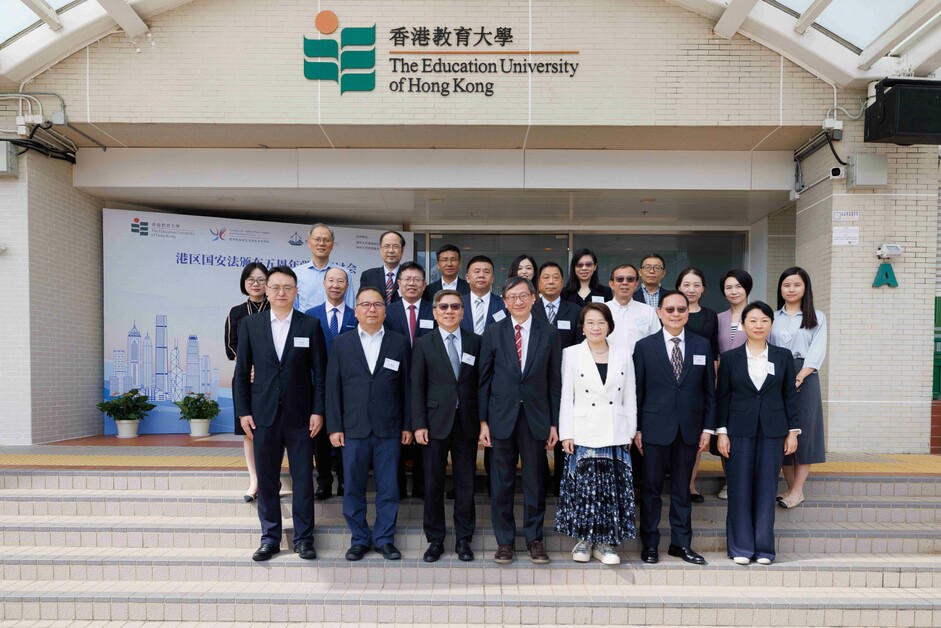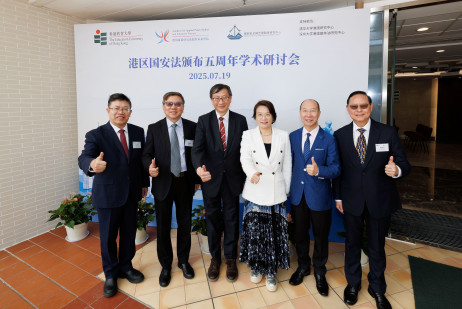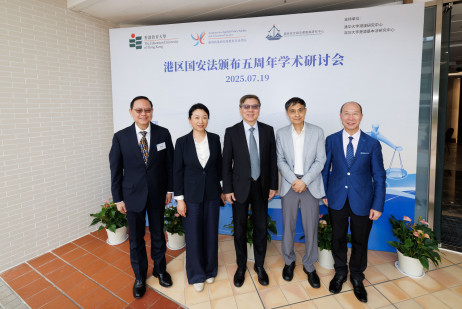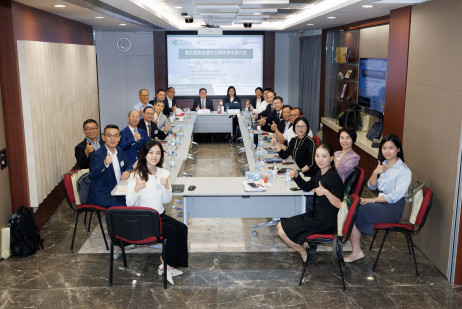The 5th Anniversary of the Hong Kong National Security Law Academic Symposium Concludes at EdUHK
The "5th Anniversary of the Hong Kong National Security Law Academic Symposium", co-hosted by the National Security and Legal Education Research Centre of the Education University of Hong Kong (EdUHK), the Tsinghua University Centre for Hong Kong & Macau Studies, and the Centre for Basic Laws of Hong Kong and Macau Special Administrative Region, was successfully held on 19 July 2025 at EdUHK. The symposium, themed "Ensuring the Steady Implementation of ‘One Country, Two Systems’ through the Hong Kong National Security Law (HKNSL)", brought together esteemed legal experts and scholars from Mainland China, Hong Kong and Macau to discuss the historical significance, legal effectiveness, and future development of the HKNSL, providing attendees with profound and multi-dimensional insights.
The symposium was divided into three main themes:
- The Historical Significance and Legal Effectiveness of the HKNSL
- The Role of the HKNSL in Optimising Hong Kong’s Governance Framework
- The Implementation of the HKNSL from an International Perspective
The event commenced with opening remarks by Professor Gu Minkang, Director of the National Security and Legal Education Research Centre of the EdUHK. Professor Gu emphasised that the HKNSL serves as a vital cornerstone for maintaining Hong Kong's social stability and prosperity. Over the past five years, it has provided a new safeguard for Hong Kong's legal framework. EdUHK will continue to promote national security education, deepen legal research, and enhance public awareness of national security.
Theme 1: The Historical Significance and Legal Effectiveness of the HKNSL
Professor Priscilla Leung Mei-fun (Hong Kong Legislative Council Member and National People's Congress Deputy):
Professor Leung emphasised the critical role of the HKNSL in safeguarding national security, protecting human rights, and promoting social stability in Hong Kong. She pointed out that the HKNSL laid a solid foundation for completing the enactment of local legislation on Article 23 of the Basic Law. She also highlighted the HKNSL’s role in attracting international investment by creating a secure environment.
Professor Lin Feng (Dean, School of Law, City University of Hong Kong):
Professor Lin analysed the HKNSL’s impact on the legal systems of Hong Kong and Mainland China, acknowledging its success in integrating Hong Kong's national security framework into the country's overall security system. He stressed that the HKNSL is a constitutional document on par with the Basic Law, enhancing Hong Kong's legal institutions and further consolidating its national security framework through the Safeguarding National Security Ordinance.
Professor Fu Jianci (President, Association for the Promotion of Rule of Law, Education, and Technology):
Professor Fu discussed the HKNSL’s positive impact on attracting international investment and strengthening Hong Kong's rule of law. He noted that the law has bolstered foreign investors’ confidence in Hong Kong's security environment.
Professor Bi Yanying (Vice President, University of International Relations):
Professor Bi elaborated on how the HKNSL innovatively uses the rule of law to address national security risks while enriching the “One Country, Two Systems” framework. She emphasised the importance of institutional innovation and acknowledged that the essence of the “Holistic Approach to National Security” has been reflected in the HKNSL, providing new directions for the development of Hong Kong’s and China's legal systems.
Professor Guo Tianwu (Professor, School of Law, Sun Yat-Sen University):
Professor Guo explored the integration of the HKNSL with local legislation, analysing how legislative interpretation and supportive measures could achieve seamless alignment. He specifically addressed the challenges in judicial cooperation, intelligence sharing, and procedural enforcement, advocating for further improvements to the relevant systems.
Professor Gu Minkang (Director, National Security and Legal Education Research Centre of the EdUHK):
Professor Gu shared his insights on the "changes and constancies" in Hong Kong over the past five years since the promulgation of the HKNSL. He acknowledged that the HKNSL has not only brought about stable development in Hong Kong, but has also enhanced the general public's understanding of our home country, enabling them to correctly comprehend the relationship between "One Country" and "Two Systems".
Theme 2: The Role of the HKNSL in Optimising Hong Kong's Governance Framework
Professor Zhao Guoqiang (Visiting Professor, Faculty of Law, University of Macau):
Professor Zhao shared Macau's legislative experience with its national security law, noting that Macau had completed its enactment of local legislation on Article 23 of the Basic Law in 2009 and had significantly amended it in 2023. He suggested that Hong Kong could learn from Macau's approach by not restricting itself to the contents of Article 23 but focusing on safeguarding any legal interests at stake. He also emphasised the importance of strengthening the mechanisms of handling crimes such as sedition and collusion with foreign forces.
Professor Zou Pingxue (Director, Centre for Basic Laws of Hong Kong and Macau Special Administrative Regions, Shenzhen University):
Professor Zou highlighted the importance of supportive measures for implementing the HKNSL, proposing improvements to the judicial system and administrative enforcement. He analysed how Hong Kong could strengthen its national security framework through fostering collaboration among the relevant institutions, such as the National Security Commission and the Office for Safeguarding National Security.
Professor Lin Laifan (Director of the Center for Hong Kong and Macau Studies, Tsinghua University):
Professor Lin analysed the dynamic exercise of central oversight over Hong Kong's national security affairs, emphasising the roles of the National Security Commission and the Office for Safeguarding National Security. He also proposed that Hong Kong should enhance its relevant supportive measures to meet the challenges of the new era.
Professor Jiang Chaoyang (Professor, Faculty of Law, University of Macau):
Professor Jiang discussed the legal guarantees of “patriots governing Hong Kong” and analysed the specific requirements for public officials to pledge allegiance to the HKNSL. For example, under Article 35 of the HKNSL, public officials who violate the law will be disqualified. He also shared Macau's experience in conducting candidate eligibility reviews through its National Security Commission.
Dr Wong Kong-tin (Chairman, Organising Committee of the GBA Young Lawyers Forum):
Dr Wong shared practical experiences in promoting national security education at the community level, using vivid historical examples (such as the East River Column's anti-Japanese resistance) to illustrate how the public awareness of national security can be enhanced. He underscored the importance of visualising and localising national security education.
Theme 3: The Implementation of the HKNSL from an International Perspective
Professor Albert Chen Hung-yee (Cheng Chan Lan Yue Professor and Chair of Constitutional Law University of Hong Kong):
Professor Chen analysed the formation of case law under the HKNSL and compared the legal standards for sedition across jurisdictions. He noted that Hong Kong's interpretation of sedition differs from that of the UK and Canada but aligns with local legal principles.
Professor Mo Ran (Associate Professor and Vice Dean, Faculty of Law, Guangdong University of Finance):
Professor Mo discussed the challenges posed by the development of the “low-altitude economy” to national security, particularly regarding unmanned aerial vehicles (UAVs), data security, and infrastructure protection. She proposed improving cross-border data-sharing mechanisms and establishing preventive regulations to address the potential risks.
Professor Zhu Yikun (Executive Director, Institute of One Country, Two Systems and Basic Law, Jinan University):
Professor Zhu analysed the HKNSL’s effectiveness in protecting corporate operations from the perspective of company law, noting the law's importance in ensuring the security of business operations.
Professor Jiang Zhaoxin (Professor, School of Law, Shandong University):
Professor Jiang compared the “large and small national security concepts” across jurisdictions and examined challenges in the implementation of the HKNSL in Hong Kong. He also discussed how legislative interpretation could further refine the legal system.
Professor Wang Yanling (Professor, School of Law, South China Normal University):
Professor Wang shared insights into the application of artificial intelligence in HKNSL enforcement and its future development, exploring how legal technology could enhance the efficiency and impact of national security frameworks.
Conclusion and Outlook
Following the presentations and discussion by experts and scholars, the symposium concluded with closing remarks by Professor Gu Minkang, who summarised the effectiveness of the HKNSL over the past five years and thanked the speakers and attendees for their participation. He emphasised the importance of continuously researching on the HKNSL to consolidate Hong Kong's legal foundation and to promote the further development of “One Country, Two Systems.” He also urged all sectors of the society to work together in advancing national security education to contribute to Hong Kong's long-term prosperity and stability.
The symposium ended with attendees unanimously agreeing that the HKNSL has provided robust safeguards for Hong Kong's social stability and economic development. They expressed hope for improving national security legislation and implementation mechanisms to address future challenges.
-Ends-







